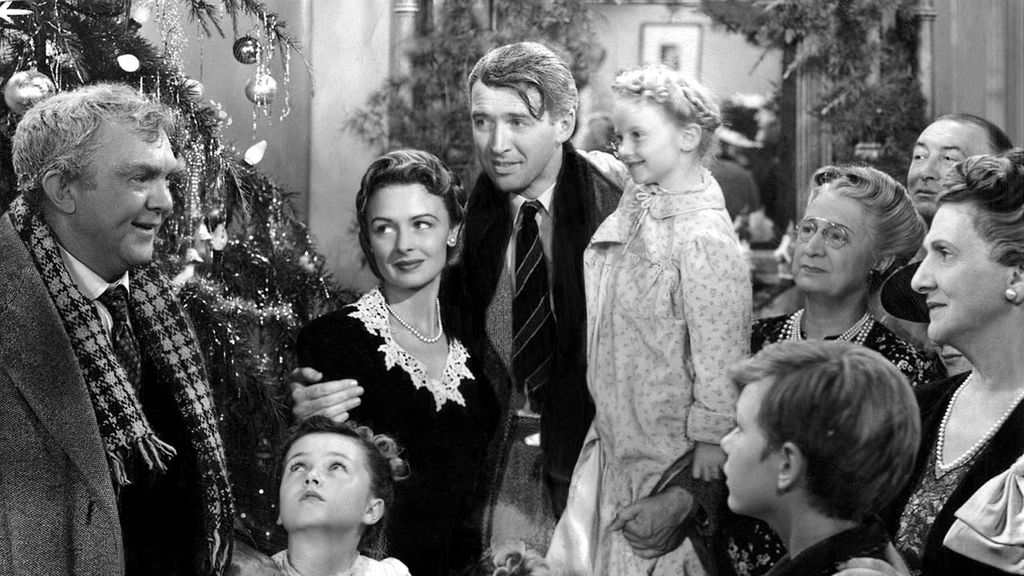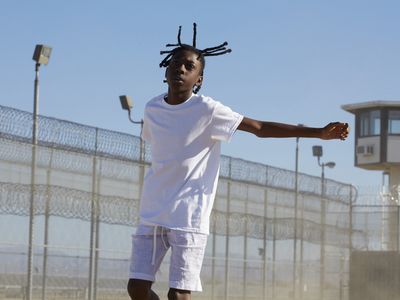Tacoma's movie theaters are in an awards state of mind, with Golden Globe and potential Oscar contenders A Beautiful Day in the Neighborhood and Parasite playing in various theaters. Meanwhile, The Irishman and Marriage Story are still playing at The Grand Cinema through tonight. See all of our film critics’ picks below, and, if you're looking for even more options, check out complete movie times listings.
Note: Movies play Thursday–Sunday unless otherwise noted
A Beautiful Day in the Neighborhood
It’s unusual to witness real cinematic magic these days, but the Fred Rogers biopic A Beautiful Day in the Neighborhood absolutely has it. Director Marielle Heller (Diary of a Teenage Girl, Can You Ever Forgive Me?) wisely avoids the visual slickness one might expect from a Tom Hanks-centric melodrama, instead employing a lived-in style and scene transitions that consist of miniature cities harkening back to the opening of Mister Rogers’ Neighborhood. Hanks is totally committed to Rogers’ appearance and manner, but A Beautiful Day is more about Lloyd Vogel (Matthew Rhys) a fictional journalist profiling Rogers. (Vogel’s work is based on a 1998 Esquire profile by Tom Junod; as is the case with the film, Junrod’s piece sketches a beautiful yet enigmatic image of Rogers.) Where Heller’s film becomes transcendent is in its cinematic pressure points: The striking slowness of the narrative (it’s meant to emulate the pace of Rogers’ show, and you get used to it), the mirroring of Rogers and Vogel in their interview styles and drawn-out reaction shots, and a profound moment of silence that grips your heart like, “Did that really just happen? Why was that so intense?” SUZETTE SMITH
Various locations
Dark Waters
As infuriating and horrifying as the subject matter of Dark Waters is—it’s based on “The Lawyer Who Became DuPont’s Worst Nightmare,” a 2016 New York Times Magazine story about how Robert Bilott (Mark Ruffalo), a corporate lawyer with a history of representing chemical companies, switched sides to reveal DuPont’s decades of catastrophic malfeasance—it is, in many ways, another paint-by-numbers, based-on-a-true-story legal thriller with the genre-mandated tropes: A delicate but driven score that sounds like the same delicate-but-driven score in every other fight-the-power thriller; a righteous speech (in Dark Waters, Tim Robbins gets the big one, and he takes full-throated advantage); and plenty of invectives like “The system is rigged!” and “They’re a titan of industry! They can do whatever they want!” None of that stuff’s bad—it’s pretty much what any lefty who’s excited to see Dark Waters, including me, is happily signing up for—but there’s a catch that elevates this movie to something better than usual. Portland arthouse director Todd Haynes (Far From Heaven, Carol) oversees things here, capturing Dark Waters’ sickening story in chilly blues and jaundiced yellows while knowing exactly how to get the most from his cast. ERIK HENRIKSEN
Various Locations
Ford v Ferrari
If you’re a lover of car-racing movies, you should probably check out Ford v Ferrari—because this film is likely to be one of the last of its kind. A biopic about the late ’60s rivalry between failing racecar company Ferrari and the “wants to be sexy soooo bad” Ford Motor Company, F v F is about how corporations can’t help but crush the passion and innovation they so desperately need. The problem? It’s impossible to ignore the two elephants in this room: The fetishization of white male toxicity and car culture, topics which society is trying to deal with and solve… not celebrate. This makes Ford v Ferrari a very good movie that, a decade ago, would’ve been considered great. Now it feels like a brand-new film that’s already an antique. WM. STEVEN HUMPHREY
Various Locations
Frozen II
It starts out with Young Elsa and Young Anna, and, I don’t know, this is just my opinion, but I didn’t think that part was very necessary, necessarily? I thought the story was good. I thought the parts were well thought out and they had some depth to them, if you know what I mean? Like some parts were really sad, and some parts could be interpreted in a lot of different ways. Also, you know how in the first Frozen, there’s like this main song that you know is the main song? In this one, there’s like three or four different songs that could be that main song. There were songs that like Elsa and Anna and Kristoff sang that could qualify for that position. I thought they were fine. SIMON HAM, AGE 12
Various locations
Harriet
Aside from the assistance that the formerly enslaved Harriet Tubman got from the Underground Railroad, it’s hard to imagine exactly how she pulled off all her heroics. With Harriet, audiences are given a live-action reimagining of Harriet Tubman’s journey to self-liberation: changing her name, hiding in bales of hay, being chased by dogs, and getting cornered by armed men on a bridge before jumping into the river. Harriet shows how Tubman (Cynthia Erivo) got help from a secret network of safe houses and trusted free Blacks (Leslie Odom Jr. and Janelle Monáe) who stuck their necks out to help her cause. Throughout the film, the only music you’ll hear, gladly, are negro spirituals—songs that enslaved Blacks used to express their sorrow and joy, and to secretly communicate. (Tubman, who was nicknamed Moses, would sing “Go Down Moses” as a signal to enslaved Blacks that she was in the area, and would help anyone who wished to escape.) Harriet doesn’t subject the sensitive viewer to excessive gore or violence (though there is one particularly unsettling scene), because for once, this is a story in the “slave movie” genre about tremendous triumph, leadership, and Tubman’s unwavering faith, both in God and herself. JENNI MOORE
Various Locations
Fantastic Fungi
At its worst, Fantastic Fungi gets too woo-woo wacky for its own good (when the film’s discussion turns to magic mushrooms, the visuals turn into what is, as far as I can tell, just a psychedelic screensaver from Windows 95), but at its best, the doc pairs fantastic time-lapse imagery with a good dose of actual, mind-blowing science. Affable, passionate mushroom researcher Paul Stamets is joined by talking heads Michael Pollan, Andrew Weil, and narrator Brie Larson to examine everything from massive fungal networks that carry signals between disparate, distant plants to the psychological benefits of psilocybin. It’s an uneven trip, but a good one. ERIK HENRIKSEN
The Grand Cinema
The Irishman
A reality-inspired crime epic that spans decades, The Irishman’s heart is Frank Sheeran (Robert De Niro), who “paints houses” for big-shot gangsters; his paint, it should be noted, only comes in blood red. Sheeran’s main employer/benefactor/BFF is the intense, sharp-eyed Russell Bufalino (Joe Pesci), though once Jimmy Hoffa (Al Pacino) enters the picture, Frank’s torn between the sometimes clashing demands of two hard-willed, charismatic men. De Niro’s great (and, thankfully, the distracting, de-aging CGI fades into the background after a while), but this is Pesci and Pacino’s movie: With mania and fury, Pacino rips every scene apart, while Pesci takes a different approach, subtly and slowly building an aging crime boss who’s both heart-achingly soulful and blood-chillingly brutal. Seeing Scorsese masterfully track all this harkens back to Goodfellas and Casino, but the jarring, moving The Irishman is, remarkably, better than both. While the intense focus on Frank & Pals comes at the expense of other characters, like every single woman, the end result is still stunning: A saga that’s horrifying and funny and melancholy, sometimes in different scenes, sometimes all at once. ERIK HENRIKSEN
The Grand Cinema
Thursday only
It's a Wonderful Life
Shortly after It's a Wonderful Life's 1946 release, James Agee, one of the few American film critics of that era still worth reading, noted the film's grueling aspect. "Often," he wrote, "in its pile-driving emotional exuberance, it outrages, insults, or at least accosts without introduction, the cooler and more responsible parts of the mind." These aesthetic cautions are followed, however, by a telling addendum: "It is nevertheless recommended," Agee allowed, "and will be reviewed at length as soon as the paralyzing joys of the season permit." Paralyzing joys are the very heart of George Bailey's dilemma; they are, to borrow words from George's father, "deep in the race." The sacrifices George makes for being "the richest man in town" resonate bitterly even as they lead to the finale's effusive payoff. Those sacrifices are what make It's a Wonderful Life, in all its "Capraesque" glory, endure. SEAN NELSON
Blue Mouse Theatre
Jojo Rabbit
The latest from Taika Waititi starts off with a bright, Wes Andersonian whimsiness: Young Jojo (Roman Griffin Davis) joyously bounces about at summer camp, having the time of his life as he frolics and laughs with his second-best friend Yorki (Archie Yates) and his first-best friend, the imaginary Adolf (Waititi). Just one thing: Jojo is at Hitler Youth camp—their campfire activities include burning books—Adolf is Adolf Hitler, and World War II is winding down, with Germany not doing so great. Both because of and in spite of its inherent shock value, Jojo Rabbit—based on a book by Christine Leunens—is just as clever and hilarious as Waititi’s other movies, but as it progresses, the story taps into a rich vein of gut-twisting melancholy. There’s more to the complicated Jojo Rabbit than first appears, and only a director as committed, inventive, and life-affirmingly good-hearted as Waititi would even have a chance of pulling it off. He does, to unforgettable effect. ERIK HENRIKSEN
Various locations
Joker
The first half hour unfolds like a dog-whistle symphony for insecure guys who think they have it bad. Fleck berates his black social worker (Sharon Washington) for not listening to him when she’s obviously doing her best. He fixates on a black single mother (Zazie Beetz) after the briefest sign of camaraderie. Yet there are a series of trap doors throughout Joker that unexpectedly drop its audience into new perspectives. Early on, an obvious foreshadow shifts Fleck onto a new path, and as that plotline plays out, Joker offers some surprisingly rewarding reflections on the relationship between the villain and Batman. (Oh yeah! This is a Batman movie, remember?) Both men, Joker suggests, might be equally deranged, making sweeping moves against the world without regard for those who become collateral damage for their respective manias. SUZETTE SMITH
Various Locations
Knives Out
Knives Out [is] Rian Johnson's phenomenally enjoyable riff on a murder-mystery whodunit. The less you know going in, the better, but even those familiar with mysteries will likely be caught flat-footed. Things begin in the baroque mansion of famed mystery novelist Harlan Thrombey (Christopher Plummer), who is very, very dead. Through flashbacks, monologues, and the genteel but razor-sharp questioning of investigator Benoit Blanc (Daniel Craig), we meet the rest of the Thrombeys—played by Jamie Lee Curtis, Michael Shannon, Toni Collette, Katherine Langford, and more, with everyone clearly having a goddamn blast—and we hear about a billion motives and a billion alibis. Somebody killed Harlan, and while Benoit Blanc is on the case, Knives Out quickly spirals into unexpected territory. In a time when filmgoing is dominated by familiar franchises, seeing an original movie executed with as much care, glee, and skill as Knives Out feels like an experience that's entirely too rare. ERIK HENRIKSEN
Various locations
Marriage Story
In 2005, Noah Baumbach wrote and directed The Squid and the Whale, a movie that dug deep into what it feels like to be a kid in a family that's pulled itself past its breaking point. Almost 15 years later, Baumbach's written and directed Marriage Story, a movie that digs deep into what it feels like to be a husband and a wife in a family that's pulling itself past its breaking point. As was the case in Squid and the Whale, the specifics are aggressively upper class: Nicole (Scarlett Johansson) is a big-deal actress, Charlie (Adam Driver) is an acclaimed theater director, and along with their young son Henry (Azhy Robertson), they spend much of Marriage Story at either a bougie apartment in Manhattan or a bougie house in West Hollywood. But once again, Baumbach—within the film's opening seconds, even—drills down to unearth the singular combination of grief, fury, melancholy, and pain that can only come from divorce. Marriage Story is brutal and sharp, but it's also funny and sweet, and captures something that's impossible to put into words: The feeling of life as it changes, and the feeling of stories as they come to an end. ERIK HENRIKSEN
The Grand Cinema
Thursday only
Pain and Glory
Pedro Almodóvar has long warmed his filmography with flickers of details from his personal life, but Pain & Glory brings us closer to the flame. In it, we look in on Salvador Mallo (Antonio Banderas), a filmmaker in self-imposed exile due to a creative decline and a variety of physical ailments. Banderas stifles his melodramatic tendencies to subtly and powerfully reveal Mallo’s agonies and evolution. ROBERT HAM
The Grand Cinema
Parasite
Parasite is director Bong Joon-ho at his very best. It's a departure from the sci-fi bent of his recent movies, though it's no less concerned with the state of society today. Set in Seoul, South Korea, the families and class issues at play reflect our global era, in which the disparity between the haves and have-nots seems to be widening. Parasite follows the Kim family, who secretly scam their way into the lives of the wealthy Park family. Slowly and methodically, the Kims begin to drive out the other domestic workers at the Park residence, each time referring another family member (who they pretend not to know) for the vacant position. And so the poorer family starts to settle comfortably into the grift—until a sudden realization turns their lives upside down. The resulting film offers an at turns hilarious and deeply unsettling look at class and survival, its essence echoed in the environments the characters inhabit. JASMYNE KEIMIG
Various locations
Queen & Slim
Queen & Slim may be the best—and is almost certainly the Blackest—film of 2019. One of the most striking things about the movie is that it’s intentionally absent of the white gaze. The directorial debut of Melina Matsoukas, it’s also the first film-length screenplay written by Lena Waithe, who knocked bestselling author James Frey’s original story idea out of the park after also making the jump from acting and writing on TV. Queen and Slim (Jodie Turner-Smith and Daniel Kaluuya) are ordinary law-abiding citizens who, after an okay Tinder date, get pulled over by a racist cop who decides to create a life-or-death altercation over a missed turn signal. After the unreasonably angry cop escalates the situation, unnecessarily searches the car, and shoots Queen in the leg, Slim ends up grabbing the cop's gun and killing the officer in self-defense. The two decide they have no choice but to evade law enforcement to survive. At the film’s heart are powerful, too-true themes about Black people’s constant search for freedom, even in modern society. In Queen and Slim’s case, their entire trip together is a relentless quest for freedom, and they have a really good run until the bitter—and iconic—end. JENNI MOORE
Various locations
Richard Jewell
Clint Eastwood directs this based-on-a-true-story movie about an amateur security officer who, despite his heroic actions saving lives at the Olympics, is accused of terrorism. It's being called "a decent portrait of an injustice" (Gary M. Kramer, Salon.com) and "the most Clint Eastwood-y Clint Eastwood movie imaginable" (Bill Goodykoontz, the Arizona Republic), but has been marred by its false portrayal of a real-life journalist, Kathy Scruggs, as a devious and sexually manipulative woman, notably showing her offering to trade sex for a news tip. Scruggs is dead and can't defend herself. Not cool. JOULE ZELMAN
Various Locations
The Two Popes
Popes Benedict (Anthony Hopkins) and Francis (Jonathan Pryce) argue over doctrine and politics in 2013 in this film by acclaimed director Fernando Meireilles (City of God).
The Grand Cinema
Also Playing:
Our critics don't recommend these films, but you might like to know about them anyway.








